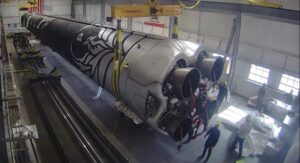General Atomics selects Firefly to launch NASA Earth science instrument
By Jeff Foust

WASHINGTON — General Atomics selected Firefly Aerospace to launch a small Earth science satellite for NASA on an Alpha rocket in 2022.
General Atomics Electromagnetic Systems announced Feb. 18 that it will launch its Orbital Test Bed (OTB) 2 satellite on Firefly’s Alpha rocket from Vandenberg Air Force Base in California. The companies did not disclose the terms of the contract.
OTB-2 will carry a NASA instrument, the Multi-Angle Imager for Aerosols (MAIA), intended to study particulate matter air pollution in urban areas and help scientists understand their effects on human health. The spacecraft will operate in a polar orbit at an altitude of 740 kilometers.
In a statement, Scott Forney, president of General Atomics Electromagnetic Systems, said the contract leveraged “Firefly’s inventive launch capabilities with our novel approach to satellite design and development” but didn’t explain why the company selected a rocket yet to make its first launch beyond stating that Alpha “meets all technical and performance requirements” for the mission.
General Atomics had the ability to select the launch vehicle for the mission, rather than NASA, because of the nature of its contract with the agency. NASA awarded General Atomics the contract to fly the MAIA instrument through its Earth Venture Instrument program, which flies instruments as hosted payloads on spacecraft or the International Space Station. General Atomics won a $38.5 million contract from NASA in August 2018 to fly the MAIA instrument, a total which included both the spacecraft and launch services.
OTB-2 is a larger version of the company’s OTB smallsat, which launched in 2019 as part of the Space Test Program 2 mission on a SpaceX Falcon Heavy. That spacecraft hosted several payloads, including NASA’s Deep Space Atomic Clock and a modular solar array developed by the Air Force Research Laboratory.
The MAIA contract is the latest in a series of awards for Firefly as it nears the first launch of its Alpha rocket. In December, the company won a NASA Venture Class Launch Services launch contract valued at $9.8 million to launch two sets of cubesats into polar orbits. It won a $93.3 million contract from NASA’s Commercial Lunar Payload Services program Feb. 4 for the 2023 launch of the company’s Blue Ghost lander carrying NASA payloads. That lander will be launched on another company’s rocket rather than Alpha.
The first Alpha rocket is currently undergoing launch preparations at Vandenberg. Tom Markusic, chief executive of Firefly, said Jan. 26 that the launch would take place in a “few short weeks,” but the company has not yet announced a specific launch date.
February 22, 2021 at 05:39PM
via SpaceNews read more...

Post a Comment